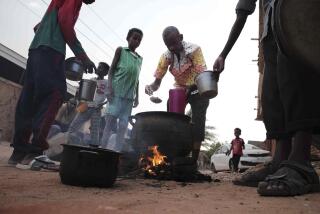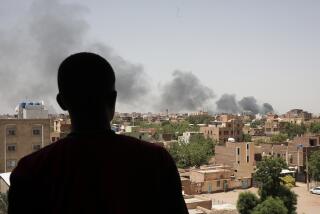U.S. Diplomat Faces Off With Sudanese Official
- Share via
SHEK EN NIL, Sudan — Wrapping up his fourth tour of the troubled Darfur region this year, Deputy U.S. Secretary of State Robert B. Zoellick warned Thursday about a new cycle of violence threatening western Sudan and sparred with a Sudanese government official he accused of trying to prevent him from getting the “straight story.”
Zoellick arrived here this week as part of a U.S. diplomatic campaign to jump-start the stalled peace process in Darfur, where rebels have battled militiamen believed to be backed by the Sudanese government.
During a five-day trip to Sudan and Kenya, Zoellick met with Sudanese President Omar Hassan Ahmed Bashir, rebelleaders, tribal chiefs and refugees, assuring them that the U.S. remained committed to bringing peace to this African nation.
U.S. officials are increasingly concerned about renewed violence in western Sudan and the stalemate of peace negotiations in the Nigerian capital, Abuja.
The conflict, which the U.S. has condemned as genocide, has killed an estimated 180,000 people and displaced 2 million.
Security in Darfur had begun to improve earlier this year, but in September clashes resumed between rebel groups and government soldiers and the militias, known as janjaweed, which American officials say are backed by the government in Khartoum.
Compared with the hopeful signs observed during Zoellick’s last trip, in July, the latest tour was fraught with frustrations.
At the first stop in Kenya, Zoellick hoped to soothe recent infighting among Darfur’s rebel leaders, but some guerrilla commanders stormed out of the meeting and others never showed up.
On Thursday, hours before he visited a U.S.-funded school at Kalma refugee camp near Nyala, in southern Darfur, armed men on horseback reportedly attacked the camp, killing one person, according to aid workers.
Then, while standing atop the ashes of huts burned down in a recent attack in the Darfur village of Shek en Nil, Zoellick engaged in a shouting match with a local Sudanese bureaucrat who was shadowing the delegation to monitor what African Union observers were telling the U.S. official about the incident.
AU observers said the attack, part of a spasm of violence in the area in September that reportedly killed 81 people and displaced 30,000, was launched by janjaweed. The local official insisted that rebels were responsible.
“Either you go,” Zoellick told the official, “or I go to Bashir and tell him you’re uncooperative.... I’m going to tell him that I can’t come here and get the straight story.”
Undaunted, the Sudanese commissioner, Sadiq Abdel Nebi, faced down the No. 2 State Department official, telling him that he was in charge of the area. “I’m Bashir here,” the commissioner repeatedly told Zoellick.
“I can’t trust your government,” Zoellick replied, ordering the man away from the delegation.
“Out,” Zoellick finally shouted at him. “Out!”
The exchange illustrated the growing impatience of U.S. officials who have been trying to negotiate peace in Sudan since 2001, pressuring Khartoum to negotiate with rebels, first in the south and now in Darfur.
Zoellick also used his trip to highlight the risks of recent feuding inside rebel groups, particularly within the Sudan People’s Liberation Army, which is fracturing into two rival wings.
He blamed the recent upswing in violence in part on the rebel split, which has sparked a new round of attacks and counterattacks.
“It’s an example of the culture of reciprocity and violence,” Zoellick said. “That’s the cycle we have to break.”
More to Read
Sign up for Essential California
The most important California stories and recommendations in your inbox every morning.
You may occasionally receive promotional content from the Los Angeles Times.













